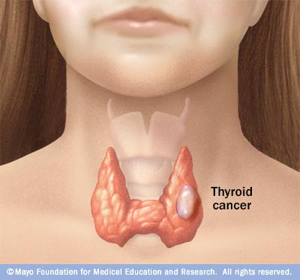Thyroid cancer
-
Thyroid cancer accounts for 2% of all new cancer in New South Wales and less than half-of-one per cent of cancer deaths
-
While uncommon, there is an increasing incidence, particularly in women – it’s the 14th most common cancer in NSW
-
The incidence of this cancer is increasing – up by around 50% in males and 85% in females
-
However, as terrifying as the thought of cancer is, most thyroid cancers are very treatable and can usually be completely cured with surgery and appropriate therapy
-
From 1997 to 2006, mortality rates remained unchanged in NSW and the survival rate was high – the five-year survival is 89% in males and 95% in females (overall the survival rate for people with thyroid cancer is 98% when the disease is localised at diagnosis)
Clinical features – thyroid cancer symptoms
Thyroid cancer usually presents with a nodule or lump in the thyroid. This may be either as a single nodule in an otherwise normal gland, or when one nodule in a goitre grows bigger and becomes more obvious . It is also possible for thyroid cancer to present with symptoms related to secondary spread of cancer, such as bone pain or a spontaneous fracture.
The clinical features vary depending on the time of presentation. An early presentation may be with just a neck lump and no symptoms. A later presentation may have additional features of hoarseness (due to pressure on the recurrent laryngeal nerve) or difficulty in swallowing and eating.
It is important to know that thyroid nodules are common, and it has been estimated that about 10% of the population will have them, but less than 5% of all thyroid nodules are malignant.
Thyroid cancer risk factors
-
Anyone can develop thyroid cancer, regardless of age or gender.
-
Some of the risk factors:
-
Radiation exposure – high doses of radiation were used during the 1950s to treat disorders of the throat and skin. Absorbed radioactive fallout following nuclear accidents is also a risk factor.
-
Chronic goitre –persistent enlargement of the thyroid gland.
-
Family history – a susceptibility can be inherited.
- Gender – more women than men develop thyroid cancer.
-
For more information about thyroid cancer causes click here
Types of Thyroid Cancer
There are five main types of thyroid cancer:
-
Papillary (>80%)
-
Follicular (10%)
-
Medullary (7%)
-
Anaplastic (2%)
-
Lymphoma (<1%)
Papillary and follicular thyroid cancers arise from follicular cells, as do anaplastic thyroid cancers. Medullary thyroid cancers arise from the parafollicular cells and lymphomas arise from the lymphatic stroma.
Squamous cell carcinoma (SCC) of the thyroid is extremely rare (less than 1% of thyroid cancers). The tumours often tend to be advanced at presentation, and have been reported to resemble the clinical behaviour of anaplastic carcinoma. The tumour seems to have a poor response to radiotherapy, but long-term survival is possible if the disease is diagnosed early and is completely resected.
In addition, the thyroid can be the site of metastases (secondary spread of cancer) from other tumours elsewhere in the body, such as renal cell cancer (kidney), breast, lung and colon cancer. Metastases to the thyroid are rare, and are usually associated with other metastases elsewhere in the body. They may appear many years after treatment of the primary cancer, and are usually easily diagnosed by FNA cytology (needle biopsy).
Thyroid cancer diagnosis
-
Diagnosing thyroid cancer involves a number of tests, including:
-
Physical examination
-
Blood tests
-
Ultrasound scans
-
Examination of the vocal cords
-
Tissue biopsy
-
If you have any questions about thyroid symptoms, you should speak to your local doctor, who will arrange to contact your thyroid surgeon

